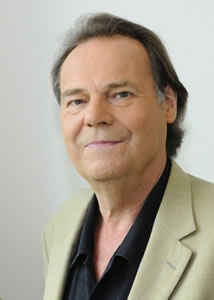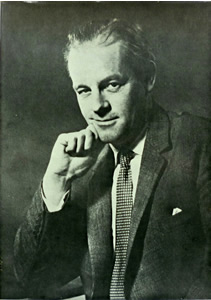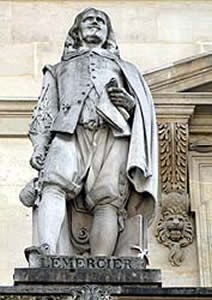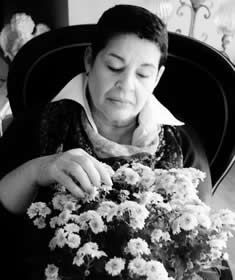|
De Duitse
schrijver Peter Schneider werd geboren in Lübeck op 21 april 1940. Zie ook alle tags voor Peter Schneider op dit blog.
Uit: Rebellion und Wahn
Man habe so vieles
unterschrieben und versucht, eine irgendwie noch mögliche Balance zu halten ...
"Aber solche schönen Überraschungen", schloss er seine Geschichte,
die er sichtlich nicht zum ersten Mal preisgab, "können einem passieren,
wenn man Äpfel klaut!"
In das
anschließende Schweigen habe ich hineingefragt: "Und wie viele Patienten
haben Sie damals nicht gesundgeschrieben?"
Halblaut wies mein
Vater mich zurecht: "Hast du eigentlich kein anderes Thema im
Moment?"
Der Wahrheit am
nächsten kommt wohl der Befund, dass wir, die Schüler des Berthold-Gymnasiums
in Freiburg, über die "dunklen Jahre" wenig wussten und auch nicht
viel darüber wissen wollten. Wir vermissten dieses Wissen nicht. Erst der
Eichmannprozess in Jerusalem und der nachfolgende Auschwitzprozess in Frankfurt
öffneten mir die Augen. Danach war die Welt nicht mehr dieselbe.
Im Frühjahr 1966
zogen L. und ich in einer Hinterhofwohnung in Schöneberg zusammen. Die Wohnung
bestand aus zwei großen Zimmern ohne Küche und Bad. Wir bauten eine Dusche ein,
die Küche blieb ein Provisorium. L. hatte ihren Job an der FU aufgegeben und
eine Arbeit in einem Antiquitätengeschäft angenommen.
Eines Abends, als
sie von der Arbeit zurückkam, fragte sie mich, ob ich etwas dagegen hätte, wenn
sie die Einladung eines ihrer Kunden zum Abendessen annähme. Ich erfuhr, dass
dieser Kunde, ein distinguierter Mann im Blazer und mit Schnallenschuhen, sich
einige Minuten vor dem Schaufenster herumgedrückt und die englischen Möbel und
wohl auch die Verkäuferin inspiziert hatte, bevor er sich entschloss, das
Geschäft zu betreten. Dann allerdings habe er den halben Laden leergekauft und
L. in seine Villa irgendwo am Wannsee eingeladen.
"Und deine
Antwort?", fragte ich.
Sie zuckte die
Schultern. Der Kunde entstamme natürlich einer anderen Welt, genauer gesagt sei
er ein Kapitalistenschwein, aber er habe erstaunlich gute Manieren an den Tag
gelegt, bilde sich nichts auf seinen Reichtum ein und sei überhaupt ganz
anders, als man ihn sich vorstelle ...

Peter Schneider
(Lübeck, 21 april 1940)
De
Columbiaanse dichteres Meira Delmar (eig. Olga Isabel Chams Eljach) werd geboren in
Barranquilla op 21 april 1922. Zie ook alle tags voor Meira Delmar op dit blog.
Returnings
I want to go back to what once upon
a time we all called our house,
to go up the old staircase,
to open the doors, the windows.
I want to stay there for a while, a while
listening to that same rain
I never knew for certain
if it was water or music.
I want to go out on the balconies
where a girl leaned out
to see the swallows arrive
that came back in December.
Maybe I can still find it
my eyes fixed on that time,
with a flame of distances
burning on the small forehead.
I want to cross the tepid patio
of sun and roses and grasshoppers,
to touch the whitewashed walls,
the absent echo of the cages.
Perhaps the doves are still
flying around it,
to show me the way
fading in the shadows.
I want to know if what I look for
is in a dream or in my childhood.
For I am lost and I must find myself,
face and soul, in another place.
Vertaald
door Nicolás Suescún

Meira Delmar (21 april 1922 - 18 maart 2009)
De Schotse
schrijver Alistair Stuart MacLean werd geboren op 21 april 1922 in Glasgow.
Zie ook alle tags voor Alistair MacLean op dit blog.
Uit: Island
They are only shadows and echoes, the animals
a child's hands make on the wall by lamplight, and the voices from the rain
barrel; the cuttings from an old movie made in the black and white of long ago.
I first became conscious of
the boat in the same way and at almost the same time that I became aware of the
people it supported. My earliest recollection of my father is a view from the
floor of gigantic rubber boots and then of being suddenly elevated and having
my face pressed against the stubble of his cheek, and of how it tasted of salt
and of how he smelled of salt from his red-soled rubber boots to the shaggy
whiteness of his hair.
When I was very small, he
took me for my first ride in the boat. I rode the half-mile from our house to
the wharf on his shoulders and I remember the sound of his rubber boots
galumphing along the gravel beach, the tune of the indecent little song he used
to sing, and the odour of the salt.
The floor of the boat was
permeated with the same odour and in its constancy I was not aware of change.
In the harbour we made our little circle and returned. He tied the boat by its
painter, fastened the stern to its permanent anchor and lifted me high over his
head to the solidity of the wharf. Then he climbed up the little iron ladder
that led to the wharf's cap, placed me once more upon his shoulders and
galumphed off again.
When we returned to the house everyone made a
great fuss over my precocious excursion and asked, "How did you like the
boat?" "Were you afraid in the boat?" "Did you cry in the
boat?" They repeated "the boat" at the end of all their
questions and I knew it must be very important to everyone.

Alistair MacLean (21 april 1922 - 2 februari 1987)
De Franse
dichter en schrijver Népomucène Lemercier werd geboren op 21 april 1771 in Parijs.
Zie ook alle tags voor Népomucène Lemercier op dit blog.
Uit: Pinto, ou la
Journée d'une conspiration
LE DUC.
Alvare , eh bien ! où sont nos chasseurs ?
ALVARE.
Fort loin. Le bois est coupé de
fondrières , de torrens, et je n'ai pu les atteindre.
MADAME DOLMAR.
Les insensés ! n'avoir pas seulement fait halte
avec nous : c'est ce comte de Commines qui les pousse.
LE DUC
Quelle joyeuse vie on mène au château d'Almada
! Nulle langueur, nul moment perdu. Chasse, jeux, festins,
fêtes, de bons amis, des femmes, et la vie d'Epicure Vivent l'indépendance et
la joie !
ALVARE.
La notre sera bientôt troublée.
MADAME DOLMAB.
Pourquoi ?
ALVARE.
Le duc part demain pour Madrid.
LE DUC.
Demain , oui ; je pars demain.
MADAME DOLMAR.
La duchesse ne devait-elle pas vous faire ici
ses adieux?
LE DUC.
Je l'attends : le
trajet qui sépare ce lieu de la ville n'est pas long , et je ne veux pas donner
matière aux discours par ma présence à Lisbonne. Ma prudence confondra
la malignité.

Népomucène Lemercier (21 april 1771 7 juni 1840)
Standbeeld in
Parijs
Onafhankelijk
van geboortedagen:
De Cubaanse
dichteres María Elena Cruz Varela werd in 1953 geboren in Colón. Zie ook alle tags voor María Elena Cruz Varela op dit blog.
Testament
My mother has arrived sprinkling
my threshold
with holy water. I see her act.
I smile still. Its no use. I say.
In silence.
My mother, her hands. For more than
three decades
they nested tenderness among my clothes.
Now they loosen my hair. Hurried. Now they want
to save me.
Its no use. I say. In silence.
Through here everyone passes by
without staying.
Through here they are passing by;
my mother, tenacious witness to my agony.
My mother. The one who never read
Miguel Hernandez.
The one who drank Vallejo in my verses.
Without knowing she was drinking. And she wants
to speak to
God.
To present him with a writ of
Habeas Corpus
while she walks back and forth, her
eyes everywhere
sprinkling my chastity with holy water.
Its no use. I say. In silence.
Poor mother, my mother.
She breaks her fury against everything.
Magnificent attack.
She knows there are no remedies to cure
my wrongs.
But she prays. The drops she scatters in
my bedroom
seem more like tears of rage. She wants
to battle
all the demons. Strip me of evil.
And I let her. Its no use. I say.
In silence.
And she is talking to God as if to
a neighbor:
she wants to convince him with a
dim allegation
that proves my innocence. And I see her.
I am rising in my flight;
There is, Madre, in the world a place called . . .
I dont remember. I am a prisoner
who forgets.
In the end its all the same; she
keeps rotating,
ties the little knots of the shawl where
is exposed
her mad hopes. And I let her.
There is, Madre, in the world a place . . .
Maybe there we may meet again.
Vertaald door Mairym
Cruz-Bernal en Deborah Digges

María Elena
Cruz Varela (Colón, 1953)
|



